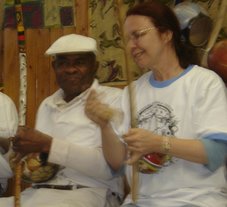Yesterday, at the CSA conference, I heard a very interesting talk on "Honour, Gender and Combat" by T.J. Desch Obi. I hadn't noticed that there was a panel including three Capoeira-related subjects scheduled for 11:15 am on Thursday on the 54-page programme until my friend and colleague Danny Dawson pointed it out to me, for which I am profoundly grateful. (Unfortunately, the only talk that focussed specifically on Capoeira was cancelled - the panelist did not turn up.)
Obi's talk ties into the work that another friend, Marcus Trower, is doing on wrestling - he also includes the role of women in what I will loosely describe as martial arts. According to Marcus's book, The Last Wrestlers, women serve more as a goad and/or prize for wrestlers, particularly in Nigeria (see his comment below).
According to Obi, women are (or were) mainly involved in Trinidadian kalenda stick fighting as the elite male fighters' "sugar mommas", but some were fighters themselves. Called jamettes, they sang kalenda war songs, which formed the basis of calypso, and were led by an older woman called a matador. Sometimes the jamettes had to beat their kept kalenda fighters with their own sticks to keep them in line.
I was fascinated by Obi's emphasis on the "femininity" of the jamettes. He stressed that the women's involvement in kalenda did not "masculinise" them. As a contribution to Obi's very interesting research, I offer these musings on gender and femininity.
Women have always been warriors. Like the lioness, who does the hunting and rearing, women have to be able to defend themselves and their young. Being weaker (on the whole) than men just makes that all the more necessary. Just as kalenda fighting involves more than sticks - an "insult fight" similar to playing the dozens is a key factor - self-defence does not always involve brute force. Forms of mental/psychological manipulation commonly known as "women's wiles" are equally effective weapons. "Women's intuition" is an effective way of staying out of trouble, or dodging a blow without seeing it coming. Women also have a higher threshhold of pain than men - or so I'm told - and childbirth bears this out.
In my experience, most of the girls and women I've known who got involved in martial arts have been extremely feminine. The main problem for women in Capoeira is developing upper body strength, but the majority of the women I've met who became deeply involved in it - whether straight, lesbian or bisexual - were all paragons of "femininity". In other words, with one or two exceptions, they didn't imitate men in their dress or behaviour, and they very much liked men, whether as mates or lovers.
Ironically, as I'll describe in more detail when I get to it, I was forced to stop practising Capoeira physically because of two inherent conditions of womanhood - pregnancy, followed by the need to support my child and husband (like a jamette). However, as I hope to show in this blog, I've never stopped practising it mentally. I still try to think like a warrior, although I've laid down my metaphorical kalenda sticks. And I still wear lip gloss and earrings ;-)
*Funny how "gender" usually means "women"!
Friday, 1 June 2007
Subscribe to:
Post Comments (Atom)


1 comment:
Hi Sabrina,
Good to read the blog. No, women definitely wrestle too in Africa. I heard Igbo men talk about how they liked strong women who could wrestle. It's just far more of a male activity, but it's not exclusively male. I also heard a lot of stories about strong women, and women who wrestled, in Mongolia, but same thing again: predominantly a male sport, and the central traditional festivals are characterised by men competing while women watch.
Abraco,
Marcus
Post a Comment